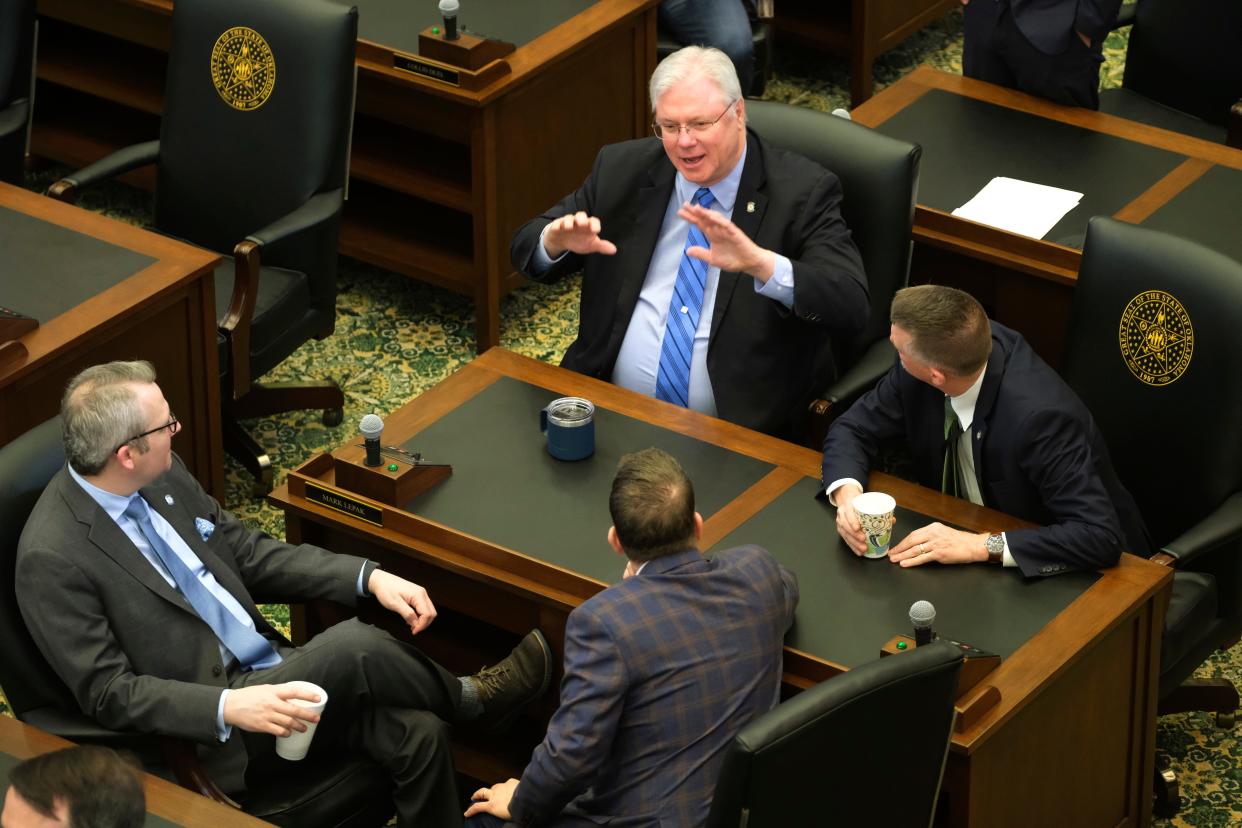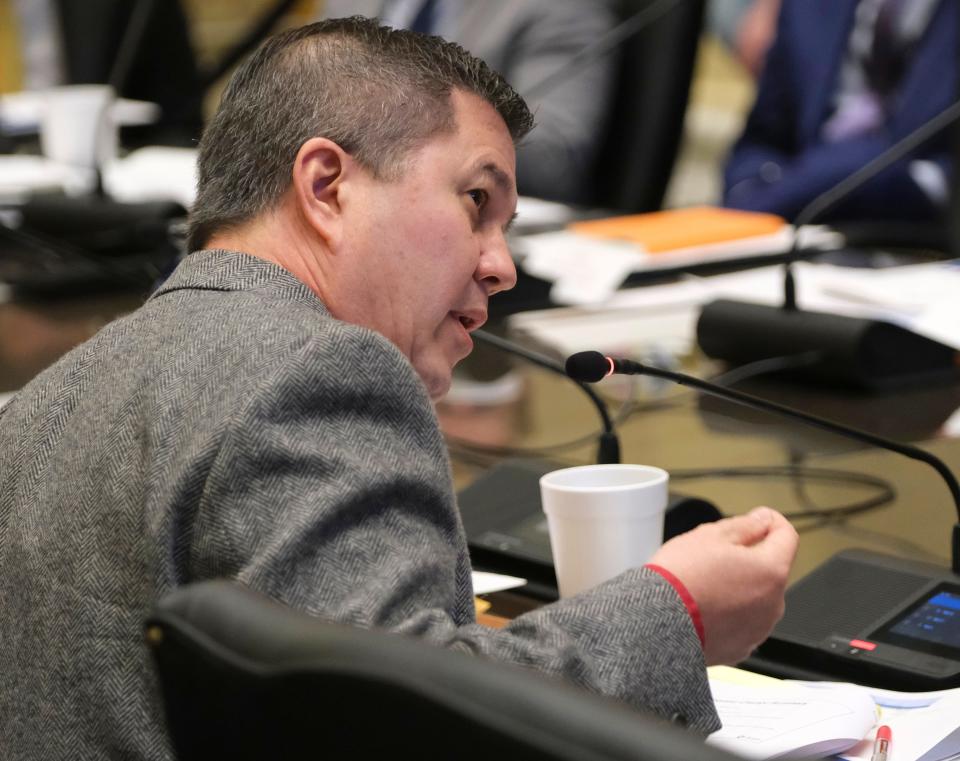House votes down resolution that would change state's judicial appointment process

- Oops!Something went wrong.Please try again later.
A controversial resolution that would have given the public the opportunity to vote whether or not to eliminate the state's Judicial Nominating Commission went down in flames Tuesday morning in the House of Representatives.
After almost two hours of questions and debate, Senate Joint Resolution 34 failed on a vote of 36-60. The measure previously had passed the Senate on March 12 by a large majority, 32-14. Tuesday, 20 members of the House's Democratic caucus joined 40 Republicans to vote against the bill. Five representatives were excused from the vote.
Though SJR 34 was defeated with a large "no" count, its author, Rep. Mark Lepak, R-Claremore, held it on a motion to reconsider, a procedural move that keeps the resolution alive for three more days.
The vote also represented a defeat for House Speaker Charles McCall.
Tuesday morning, McCall, R-Atoka, remained on the House floor, speaking with members during both the question-and-answer period of the measure and during debate. Normally, the speaker isn't as visible on the floor during debate on legislation.
Vote for resolution would have been 'scored as a pro-life vote' by faith groups, memo from McCall said
However, Tuesday's vote came a day after McCall sent a memo to the House Republican Caucus urging them to support the resolution. That memo, sources in the Legislature said, infuriated many members of the caucus.
A copy of the memo, obtained by The Oklahoman, said that a vote on SJR 34 "will be scored as a pro-life vote by groups such as Faith Partners (Churches) and Oklahomans for life as well as other groups."
The memo is an apparent reference to several anti-abortion organizations and lawmakers who complained when the Oklahoma Supreme Court ruled last year three anti-abortion laws that were passed in 2021 violated the due process clause of the Oklahoma Constitution and ordered a district court to rehear the case that challenged them.
"Colleagues, there is a reason this resolution passed the Senate and is now amended to preserve the House role in the process of selecting judges of the high courts," McCall wrote. "My advice to you is to 'vote your district.' However, unless you know for certain that 100 percent of your district does not want to vote on this issue, be warned, a 'no' vote will have negative implications in the present and future as it has cost previous colleagues their re-election or election to other offices. I have seen it happen with a single mailer."
The speaker's memo concluded with the statement, "these are my twelve-year observations to you and I regret not being able to deliver them to you in person."
"Also understand," the speaker wrote, "that this resolution is before us in great part because the outside parties supporting the JNC process have refused to heed my suggestion over the last six years that the JNC needed to be reformed to be preserved."
Members of the Oklahoma Bar Association opposed the resolution. Some association members said they were concerned that nomination of Supreme Court justices by the governor without involvement of the JNC, would make it more likely that future justices named to the court and their decisions would reflect the governor's political views or require potential judges and justices to pass a conservative litmus test.
Lepak said the measure would create a state question on whether or not the JNC should be abolished and replaced with the appointment system used by the federal government. He said SJR 34 made the process more transparent and gave the public more input into how members of the Oklahoma's appellate judiciary are appointed.
"This is a very clean, simple model, non-issue model, that is well understood by most people in this country because that's the federal law," Lepak said. "It is transparent. I was laughing in my head about these comments about transparency, because (right now) you don't know the questions being asked."
Opinion: Dismantling current system for nominating judges also removes voice of Oklahoma voters
Lepak said the current process was controlled by the OBA and needed sunlight. He said the public has no answers from potential judges and justices about questions such as, "if this case comes before you how would you answer?"
"How do you know whether or not that question is being asked by the JNC? Is it? Is it in public or behind closed doors?" he said. "We don't know. We've all talked about the Legislature's 'smoke filled rooms,' well, I don't think they allow smoking any more, but that's something that is happening in these closed rooms."
State Rep. Andy Fugate, a Democrat from Oklahoma City, said his concern about the measure was "the actual lack of transparency versus the myth that was being spun about all the transparency that could be afforded by this (resolution)."

"The fact of the matter is we as a Legislature have the ability if we believe there is additional transparency required to the existing process to add it," Fugate said. "I believe there is certainly a subset of those who believe they can fundamentally alter the type of rulings being handed down if they could just put their thumb on the process and the way it works to put 'those people' into positions. That's not how the judiciary should work at all."
What to know about Oklahoma's Judicial Nominating Commission
Created in 1967, the 15-member Judicial Nominating Commission was designed to take the politics out of Oklahoma’s judicial appointment process. State lawmakers moved to the commission system after a scandal rocked the Oklahoma Supreme Court in 1965. That event damaged the court’s reputation and the public's trust in the state's judiciary. It also saw three justices of the Oklahoma Supreme Court end up in prison for bribery.
Nine of the commission's members are non-lawyers, a posting on the commission's website notes, adding that "these nine cannot be admitted to practice law in Oklahoma or have an immediate family member who has been admitted to practice law in any state."
Opinion: Oklahoma Senate measure on how judges are selected is a power grab for partisan politics
In addition, the governor appoints six of the non-lawyer commissioners, one from each of the six congressional districts that existed in 1967. Each of those commissioners serve staggered six-year terms, and no more than three of those appointees can belong to any one political party. The three remaining non-lawyer commissioners serve two-year terms as members at large. The speaker of the House and the president pro tempore of the Senate each appoint a member to the commission.
Though even opponents of the system say the process has worked well, the JNC has been under fire since the early 2000. Tuesday's vote was the latest in a long line of measures that would move the state to the federal system of nominating and approving members of the appellate judiciary.
This year, three groups helped lead the charge to adopt SJR 34 and replace the existing commission. The Oklahoma Council of Public Affairs, a right-wing think tank; the Judicial Crisis Network, a national conservative advocacy group; and the Catholic Church, through its arm, the Catholic Conference of Oklahoma, have all advocated for changes to the appointment system.
Lepak's motion effectively keeps the measure alive for three more days, giving both Lepak and McCall a short window to convince members to change their vote The resolution could be heard on the House floor again between Tuesday and Thursday, should the pair convince enough members to vote for the bill.
This article originally appeared on Oklahoman: Oklahoma House votes down changes to judicial nominating process

